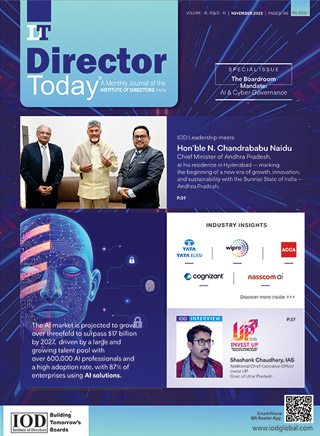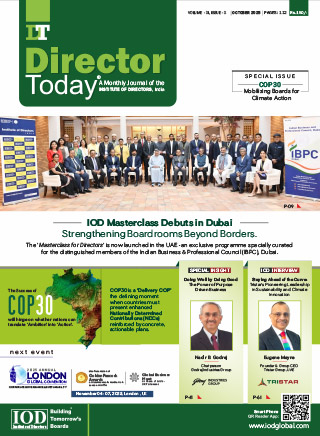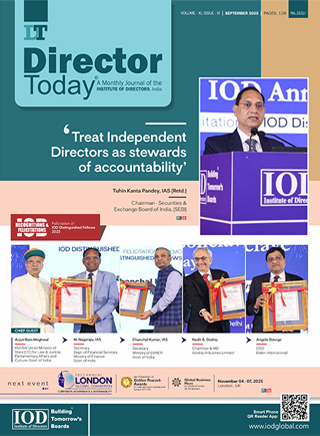Independent Directors: Why do they matter and to whom?

Introduction
Independent Directors (IDs) continue to be seen by academics, regulators and investors as cornerstones of modern corporate governance. In the UK, US and most other developed countries codes of corporate governance mandate that a majority of board directors – including the chairman of the board are deemed independent. By independence codes generally mean that such directors must not have any relationships with the company management that can impair their judgment and their fiduciary duties towards the firm shareholders. A research paper 'Does the impact of board independence on large bank risks change after the global financial crisis?' (Vallascas, F., Mollah, S., and Keasey, K. (2017) / Journal of Corporate Finance, vol. 44, issue C, 149-166) examining the introduction of more independent directors on bank's boards after the 2008 Global Financial Crisis concluded that this made no difference for the bank's level of risk taking. Despite the mounting evidence, many countries continue to bet on director independence as a key mechanism to avert corporate disaster. For example, in March 2021, the Financial Times (in an article) echoed that “Japan prepares to shake up corporate code” by strengthening “boards with more independent directors”. Institutional investors too, place significant emphasis on chairman independence and the existence of a majority of independent directors. Cases of investor moves for independent chairman include Facebook, Exxon Mobile, Anglo American, Deutsche Bank, and more. With much contrasting evidence, why do we need independent directors at all? Why do they matter? How do we make independent directors really count for something? And with the rise of sustainability, ESG and stakeholder-ism, is independence going to be easier or even more difficult to exercise and assess?
Ultimately, it is every director's responsibility to act independently. However, this is best achieved in a board where the Chair actively creates conditions for it to flourish.
A behaviour and a mindset, not a property
There is little dispute that both material independence and that of thinking are required. But how many well intentioned and capable directors have failed the test of independence? Take Royal Bank of Scotland and its troubles during the 2008-GFC. The bank was composed of a majority of so called independent directors many of which had the knowledge and the integrity built over many years of experience. How was the bank left to drift into such a perilous position? The problem is that directors are deemed independent before they enter the boardroom, but once there, independence starts eroding and many fail to act consistently in such a manner. In other words, independence is not a property that someone possesses, is a behaviour – something directors do. And the boardroom is a place that is particularly challenging for independence.
Independence: Hard to build, easy to lose
Independence is hard to build. It takes preparation, training, experience, certain qualities and a kind of self and contextual awareness that are hard to develop. It requires integrity to forego opportunities because you are not “part of the club”. Off course, I am not talking about material independence as most codes do. Codes often assume independence were there isn't any. The moment someone deemed independent walks into the boardroom independence starts eroding. So what are the type of things that can erode a director's independence?
One factor that will make a director lose independence is the passage of time. Director length of service is a well recognised and debated factor. Most jurisdictions consider 9 to 12 years to be the maximum a director can serve without significantly impairing its independent judgement. In the UK, the board needs to provide an explanation as to why a director serving for more than 9 years is still fit to serve as an independent member. It is reasonably well accepted among the international business community that with time directors become too familiar with how management and the company operates and also compromised in the ability to challenge, not least because the director will likely have been associated with past decisions that went wrong. But while length of service has certainly a corrosive effect on independence after a while, the time devoted to the director role is also a factor. While over boarded directors are now rarer in some parts of the world, in other parts they are still tolerated. Institutional investors are now actively voting out over boarded directors. The rule seems to be a maximum of 4 sizeable independent directorships (or 3, if one of them is board or audit committee chairman for example). Busy directors cannot devote the quality of time to, and engagement with the company and its stakeholders to enable him/her to form an informed and considered judgment about the company affairs. Recent evidence shows the prejudicial effect of over boarding (See for example: Hauser, R., 2018. Busy directors and firm performance: Evidence from mergers. Journal of Financial Economics, 128(1), pp.16-37), but there is evidence (Benson, B.W., Davidson III, W.N., Davidson, T.R. and Wang, H., 2015. Do busy directors and CEOs shirk their responsibilities? Evidence from mergers and acquisitions. The Quarterly Review of Economics and Finance, 55, pp.1-19) to the contrary too, especially when it comes to mergers and acquisitions. Another factor that research (Brown, G., Kakabadse, A., and Morais, F. (2020). The Independent Director in Society: Our Crisis of Governance and What to do About it. Palgrave: London) has shown to impair the exercise of independence is where a director possesses little industry and company knowledge. Many directors have confessed that too often little industry and company knowledge means a lack of understanding of relationships and areas of tension and risk that require particular attention and enquiry. Lack of time to devote to role and reduced industry and company knowledge only increases the information asymmetry between management and independent directors. A further factor that increases information asymmetry is where there is little communication between independent directors. Independent directors who do not communicate to check assumptions and judgment on information, often lack the confidence to raise issues and intervene.
A different class of factors has to do with certain dynamics or individuals on the board. Director independence seems to be constrained significantly when the serving CEO has been highly successful for a long period. Such CEOs can and often do use their past achievements to silence independent directors, and independent directors, feel discouraged from raising questions. This is at a point where success may start wobbling and scrutiny is more needed than ever, as the company starts to drift strategically. A related aspect is when the board is composed of certain charismatic and high status individuals, lets say, individuals with certain public exposure and titles, such as former ministers. Independent directors confess that some of these individuals sometimes can sway the board and go unchallenged, because there is a certain reluctance to do it by most members. Relatedly, the social context within which directors operate has its own dangers. Many directors enjoy the perks and the social side of the board relations. Invitation to exclusive events, golf at the club, cricket, and other social gatherings are persuasive and many directors enjoy the invitations and do not want to disrupt these relationships by asking the difficult questions. Many directors often like to preserve status and relationships, and that is why discussing CEO performance and facing into reputational crisis are instances when independence is really put to the test, and often fails.
A final class of factors – related to the organisation – are also commonly referred by directors as sources erosion to the exercise of independence. Organisational complexity is such a factor. Organisations that are very large and geographically spread, with highly technical products such as pharma and semiconductors for example, are significantly more difficult to understand, because of its many complexities and expert knowledge required. The information asymmetry is significantly more pronounced and the independent director will require significantly more time to get up to speed with key people, key tensions within the business, research and development and the different jurisdictions / subsidiaries each with their own challenges. Companies that are highly regulated or that have special relationships with particular stakeholders such as the government or that particularly exposed to controversies are harder for independent directors to remain independent. The Chair of a European large football club told me once that “in football clubs, evidence cuts less ice”, because the pressure of the supporters and the media exposure influences the judgment of even most independent individuals. In these cases the nature of stakeholders have a special kind of influence in the boardroom. A further and final factor is the presence of a majority controlling shareholder. In such cases independent directors – if they exist at all – find it difficult to say “truth to power”.
With so many factors impinging on independent behaviour, how can we make independence really count? The answer is off course in the chairman and how he/she is able to build the right boardroom context for it to flourish.
Independence needs a context to flourish and fulfil its role
So far we have established that independence is a behaviour, a modus operandi, and that there are many factors that therefore can erode it. We have also established that the issue is not so much an agreement about what independence is or is not, or whether independence of thinking is fundamental. The chief problem is the context within which independence is exercised (or constrained, therein). Most boards are not places where directors feel that they can exercise independence to its full extent. Research shows that the single biggest enabler of an independent board is its chairman. Once the chairman builds the board with the right skills, experience and qualities it needs then to set a context for independence to flourish. My own research in the UK context has shown that there are 9 key practices that high performing chairs draw upon to create the right board culture.
1. Assess the board culture by gathering evidence.
High performing chairs like to understand more of the board culture and how the board is understood by key stakeholders. Is it an arrogant and distant board? Is it a cosy club? Determining how the board and its members operate and are seen to operate is an important first step.
2. Create a shared purpose, values and behaviours that guide the board and organisation.
The next step is to create a shared purpose, values and behaviours that all board members sign up to. Many chairs have this has the first page of every board pack and start every meeting by reminding members of these elements.
3. Establish the non-executive / executive boundaries but be prepared to cross them if necessary.
One of the biggest sources of tension in the board is when non-executive directors go too far over the line into executive responsibilities. The high performing chair ensures that the line between executive and non-executive responsibilities is well defined and understood, but reserves the right to cross it every time its justified.
4. Promote NED only meetings.
How often do directors don't raise something for fear of missing the point or too seen as too inquisitive? Non- Executive, independent members only meetings led by the chair provide an opportunity to exchange views and impressions, enabling directors to cross check items for discussion and produce initial alignment before raising it in the meeting. This provides directors with a way of triangulating and form a more robust but constructive challenge on executive proposals. This helps the collective independence to increase and reduces time wasted or even misunderstandings.
5. Do one to ones with the CEO: create trust.
The chair CEO relationship is critical. The high performing chair has regular one to ones with the CEO to discuss how to improve board functioning and to iron out any misunderstandings or unproductive tensions that may be emerging.
6. Ensure appropriate quality and level of board information.
Good quality and timing of information is a critical component for independence to be exercised. Highperforming Chairs make no compromises when it comes to the quality of data the board and the independent directors are getting. They work with the company secretary and with the executive to ensure that it's the best it can be. In addition successful chairs agrees board practices that enable independent directors to visit operations and talk to different managerial levels in the business.
7. Lead board meeting effectively.
This involves making sure that there is plenty of time for robust debate on strategic issues, enabling constructive tension over important topics and ensuring all directors contribute in an atmosphere of openness and respect.
8. Deal with and effectively remove non-performing or toxic board members.
This is the most difficult task for chairs. As many as 60% of chairs admit to or are seen by others members as being complacent or ineffective at removing such individuals. Great chairs won't shy away from those difficult conversations and will persist until the director is replaced.
9. Use external board evaluations effectively.
Board performance reviews are becoming a mandatory requirement in many jurisdictions, and for much time they were seen as a tick box approach. No longer. Boards have now so much responsibility and pressure that reviewing their collective and individual director performance is critical to ensure its fit for purpose and protected from liability. Chairs use this as an opportunity to review and recalibrate independent behaviour.
Ultimately, it is every director's responsibility to act independently. However, this is best achieved in a board where the Chair actively creates conditions for it to flourish.
The future of Independence: It is getting harder
The emergence of sustainability and stakeholder-ism expressed in many ways through the ESG (Environmental, Social and Governance) movement has come to complicate further the exercise of independence. Thus far the exercise of independence has been facilitated by one thing: an obsessive focus on shareholders. Independence was thus a guarantee to investors that their best interests were being protected from greedy, incompetent or ultimately criminal executives. And this was difficult enough, and often didn't work. Director duties are changing, and with it, the importance of independence and how it's exercised. Directors are now being asked to be accountable for harm done to other stakeholders and in fact, to make a positive contribution to society. While in the past the purpose of independence was relatively clear (shareholder value), today, the purpose of independence is becoming more elusive and harder to enact. Recently a senior business leader was telling me about how this global bank was advising on a major oil pipeline construction project in Africa and also possibly integrating the consortium to finance its execution. The project requires that thousands of people are dislocated from their villages with human rights implications; it will clearly be a huge negative contribution to the bank's financed emissions and therefore not Paris Agreement aligned. At the same time, Africa is only responsible for 4% of global emissions, (as per CPD 2020 - CPD Africa Report: Benchmarking Progress Towards Climate Safe Cities, States, and Regions) compared to the global North and is in dear need of building its infrastructure and create employment and economic prosperity to lift many out of poverty and provide a future to the youth. So what is the right thing to do? Directors will be put more and more into situations where it is not obvious what is right thing to do for the company as a whole and the many stakeholders' often irreconcilable claims. While in the past independence had in many ways a more salient economic and oftentimes short term dimension, it is now also the moral dimension and the long term that are coming to the fore. Independent directors will require more than ever a systemic and long term and moral strength from which to reconcile contrasting agendas. Independent Director are becoming more important, not less, but they need to learn how to operate in a multistakeholder and complex world.
Author

Dr. Filipe Morais
He is a Professor in Governance and Reputation at Henley Business School (UK), and a Visiting Professor at INSEAD Paris 'Advanced Board Program' with the Scandinavian Executive Institute (SEI). He is also on the board of a financial services firm in South Africa; an Independent Partner at AMROP Lisbon office, and a Core Member of the European Board Services Practice (London). He is on the Editorial Board of California Management Review; author of multiple books, chapter, articles, and reports on corporate governance and ESG; and on the panel of 2023 ESG Investing Awards in UK. In the past Filipe worked has an HR partner/manager/director for the automotive, semi-conductor and healthcare industries.
Owned by: Institute of Directors, India
Disclaimer: The opinions expressed in the articles/ stories are the personal opinions of the author. IOD/ Editor is not responsible for the accuracy, completeness, suitability, or validity of any information in those articles. The information, facts or opinions expressed in the articles/ speeches do not reflect the views of IOD/ Editor and IOD/ Editor does not assume any responsibility or liability for the same.

 Quick Links
Quick Links
 Connect us
Connect us




 Back to Home
Back to Home































